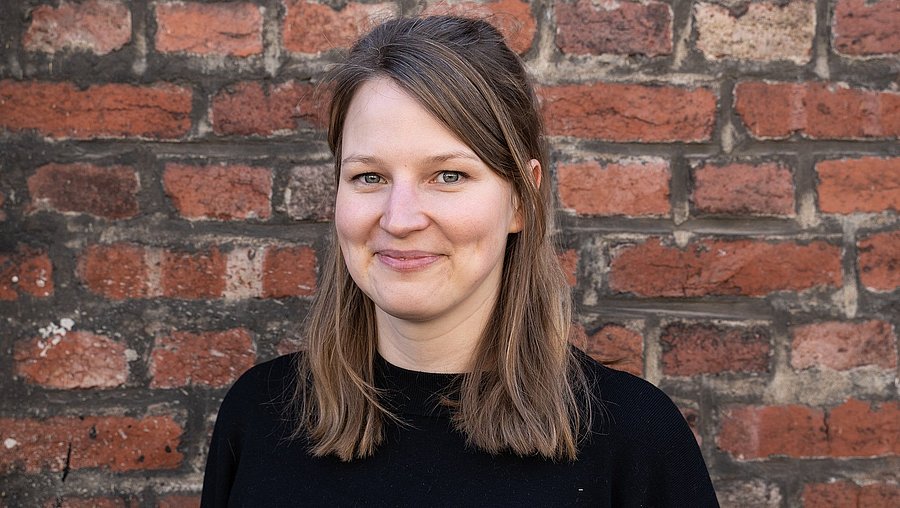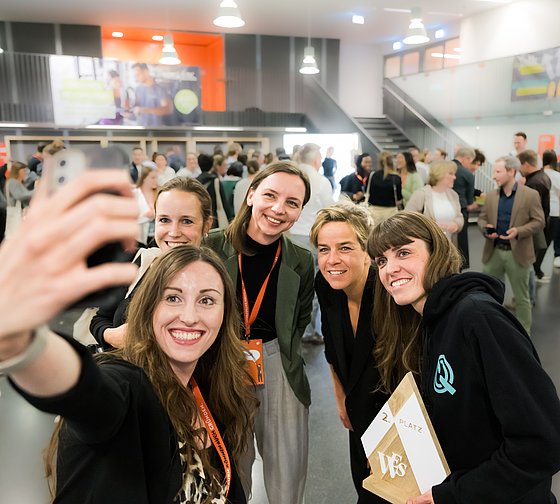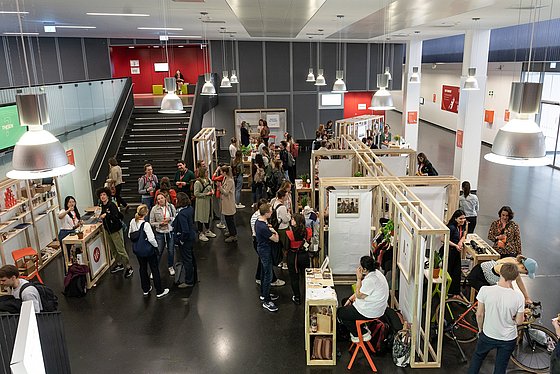
Support for female company founders
Hannah Jensen / University network 'Women Entrepreneurs in Science' (WES)
Photo: Private
Support for female company founders in the Bergisches Land region
Hannah Jensen on the nationwide university network 'Women Entrepreneurs in Science'
Mrs Jensen, at the website https://www.wes.uni-wuppertal.de/ you can find the 'Women Entrepreneurs in Science' network. What does that mean and who is behind this network?
Hannah Jensen: 'Women Entrepreneurs in Science', or WES for short, is a nationwide university network that supports female students, employees and graduates on their path to entrepreneurship. It offers workshops, exchange formats, a mentoring programme with AI-based matchmaking (matchmaking is the targeted bringing together of people or organisations based on common criteria in order to find suitable partners, editor's note), an online learning track and training for start-up consultants, which also includes gender-sensitive start-up advice, for example. The network is also aimed at female business successors.
WES is managed by the initiator and strategic director at federal and state level, Prof Dr Christine Volkmann, with an interdisciplinary team that counts six employees now. It was funded from July 2020 to February 2025 as part of the “Excellence Start-up Centre. NRW” initiative by the Ministry of Economic Affairs, Industry, Climate Action and Energy of the State of North Rhine-Westphalia. Since March 2025, it has been funded as a model project for three years by the Federal Ministry for Economic Affairs and Energy and the Ministry for Economic Affairs, Industry, Climate Action and Energy of the State of North Rhine-Westphalia. This funding means we can now roll out our services nationwide and the project will continue to operate under the WES brand.
What is the role of the network?
Hannah Jensen: In the first funding period, the focus was on developing a needs-based portfolio that is tailored to prospective female founders. This portfolio includes, for example, the implementation of the image campaign “Nahbare Gründerinnen” (approachable female founders) to increase the visibility of female founders and create approachable role models, the establishment of a mentoring programme to promote exchange and networking, the development of various event offerings to raise awareness of start-ups, workshops for prospective female founders as well as exchange formats and networking events, the establishment of a university network in NRW with over 30 universities to raise awareness and cooperatively implement the developed offerings, as well as the development of gender-sensitive start-up advice.
In the second funding period, the nationwide university network continues to grow under the established WES brand and supports female students, employees, graduates, and company successors on their start-up journey. The concept of the female founder is now being defined more broadly. The WES team not only targets female start-ups and business founders, but also opens up the network to female business successors.
The further development of the WES portfolio is based on the insights gained during the first funding period: the mentoring programme is being expanded to include AI-based matchmaking, for example, in order to take into account the needs and expectations of mentees (prospective female founders) and mentors (experienced female founders). As part of an online learning track (an online learning track is a structured and curated path through learning content that helps learners to learn a specific topic or skill step by step and in a logical way, editor's note), in future female founders will be able to complete a programme tailored to their needs regardless of time and location. In the individual modules, participants will learn the content relevant to them at their own pace. This allows them to harmonise their start-up project with their life circumstances - whether it be studies, work, family, or other interests. In order to make the start-up ecosystem more equal at all levels, WES is expanding its programmes to include other target groups[KR1] . For example, advisors, coaches and marketing managers in university start-up centres are to be specifically addressed and trained by WES in the implementation of gender-sensitive approaches, start-up advice and workshops. To this end, the offers are bundled on WES's own platform, which is gradually being made accessible via the WES website. There is also the target group of female investors, as we want to expand the network because this group is also still underrepresented.
Your mission is to attract more women to join the start-up scene. Why do so few women start up so far?
Hannah Jensen: Women face various structural barriers in the start-up ecosystem. That's why the proportion of start-ups with female founders in Germany is only 18.8 per cent. In the area of succession, the figure is similarly low at 21.2 per cent. The start-up ecosystem is still strongly male-dominated and characterised by gender stereotypes and entrepreneurial role models. While there are a large number of male role models, there is a lack of visible female role models for potential female founders. The investor landscape is also very male-dominated. In conjunction with the same-gender effect (the prioritisation of male founders by investors, editor's note), this reinforces the gender gap in the start-up scene. The responsibilities for family and household still lie largely with women. Accordingly, the compatibility of family and career is a decisive criterion for future career choices. In the area of succession, it is evident that previous owners still more frequently favour family members of the same gender for their succession.
Although women have comparable success rates in succession, stereotypical favouritism prevents them from seizing similar opportunities. Therefore, many female students do not consider this option.
There is a mentoring programme for women in your network. What help can you get there?
Hannah Jensen: Our mentoring programme offers aspiring female founders the opportunity to be supported by experienced female founders in order to develop their full potential. Mentoring takes place over a maximum period of six months and serves as a 1:1 sparring session to exchange ideas, feedback, and real experiences. Matching takes place individually on the basis of the mentee's specific expectations and the mentor's experience.
In addition to mentoring, participants can expect opportunities to use digital workshops and inputs.
In particular, matching a prospective female founder with an experienced female founder counteracts two key structural barriers. On the one hand, the mentors serve as an approachable female role model. On the other hand, the mentees expand their own network by gaining access to this one through their mentor. The women get to know each other personally and consider how they would like to work together over the next six months. They then usually meet digitally and exchange ideas. This way of collaborating makes it clear where help is needed. There is also a final face-to-face meeting at the end of the programme.

Founders SUMMIT
Photo: Andrea Bowinkelmann
They are building a network in North Rhine-Westphalia with over 30 universities. Since March 2025, the network has been funded as a pilot project by the Federal Ministry for Economic Affairs and Energy and the Ministry of Economic Affairs, Industry, Climate Protection and Energy . Do women actually need different support than men?
Hannah Jensen: Women don't need 'different' support, but support that takes into account their different starting conditions. There are structural barriers and gender bias (editor's note) that influence access to capital, networks, role models and resources. Therefore, even in start-up support, it should not be assumed that the starting positions are equal. The gender bias of gender sensitivity, for example, shows that it is important to take these different starting positions into account and also to address them in the counselling. It is therefore important to design the counselling in a gender-sensitive way in order to recognise the prevailing bias and balance it out as best as possible. This can be done, for example, by making accessible role models for women visible or by explicitly creating access to investors, other female founders and networks. The mere fact that women currently still have different time resources due to raising children or caring for parents means a different approach. It is also still common for women to be asked different questions than male candidates when presenting their start-up idea (pitch). Men are often asked very future-orientated questions, while women are more likely to be asked about the start-up idea's chances of survival. These differences must be taken into account in the counselling, because the requirements are not the same.
You are part of a team of young project members led by Prof Dr Christine Volkmann. What expertise do they all bring to this network?
Hannah Jensen: There are six of us in the team. In addition to our degrees in Entrepreneurship and Innovation, Management Studies, Management and Marketing as well as Communication and Media Studies, we have experience in event concepts, marketing activities and online campaigns and offer our help in network management, project management, IT consulting and the development of teaching content. We are all familiar with the topic of start-ups and come from the target group that we want to support, so to speak.

Exhibition area
Photo: Josephine Behr
On 29 October at 11.00 am, the 5th Founders SUMMIT will start here at the University of Wuppertal. What can visitors expect at this summit?
Hannah Jensen: The aim of the Founders SUMMIT at the University of Wuppertal is to bring together female founders, successors, people interested in founding a company, investors, mentors, and start-up consultants from all over Germany. True to the motto “Your day. Your stage. Your community.” we put different women in the spotlight and make them visible.
There is also an exhibition area. Here, female founders exhibit their products and offers. On the one hand, this exhibition is intended to give them more visibility and, on the other, to sensitise interested female students to the topic of start-ups. In a workshop, you can learn how to quickly and effectively protect a start-up digitally without any specific prior knowledge. The Capital Connect section is then a two-part event that deals with the question: How do more women acquire capital? The event offers space for exchange, inspiration and first steps into the investment world. Another programme is called 'Female Role Models' and is an interactive session with female managers, start-up founders, and company successors. In rotating groups through four themed tables, you will receive brief impulses from female experts. Succession in particular is a major topic for the future. Many companies will have to look for successors and we would like to offer this idea as a possible option. You can also take over existing companies with your own vision instead of founding a completely new one. At the same time, we offer a university network meeting, a platform for direct exchange with WES and other start-up advisors from other universities. Best practices will be shared and concrete impulses for the targeted approach of female founders will be taken away. And finally, there will be a Pitch Night. Here, Parliamentary State Secretary Gitta Connemann (Federal Ministry for Economic Affairs and Energy) and Minister Mona Neubaur (Ministry for Economic Affairs, Industry, Climate Protection and Energy of the State of North Rhine-Westphalia) will discuss the importance of female entrepreneurship in a talk with Prof Dr Christine Volkmann. On the evening of the Female Founders SUMMIT 2025, six female and mixed start-up teams will compete at the Pitch Night. In four minutes, they will present their ideas live in front of a jury and then answer questions. They will be competing for the WES Award and a total of 4,000 euros in prize money.
Interested female founders are welcome to register at https://www.eventbrite.com/cc/grunderinnen-summit-2025-4439653?utm-campaign=social&utm-content=creatorshare&utm-medium=discovery&utm-term=odclsxcollection&utm-source=cp&aff=escb.
Further information on the 5th Female Founders SUMMIT can be found at Female Founders SUMMIT 2025 - Women Entrepreneurs in Science.
Uwe Blass
Hannah Jensen studied Management & Marketing and founded a company in the mobility sector at the same time. After a three-year start-up journey, she spent some time working for a medium-sized company to set up a car-sharing scheme. Now she works in the team of the 'Women Entrepreneurs in Science' university network at the University of Wuppertal.
